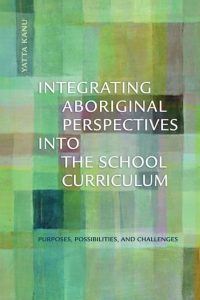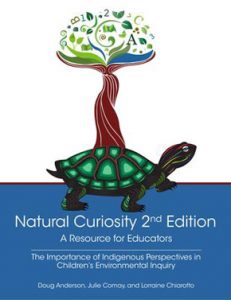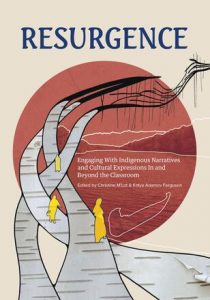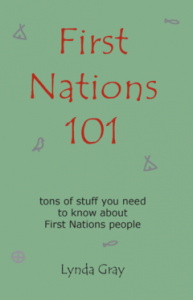Listed below are selected teacher resources and non-fiction related to integrating First Peoples’ perspectives and principles of learning into the classroom.
Vous trouverez ci-dessous une sélection de ressources pédagogiques et d’ouvrages non romanesques liés à l’intégration des perspectives et des principes d’apprentissage des Premiers Peuples dans la salle de classe.
Teacher Resources
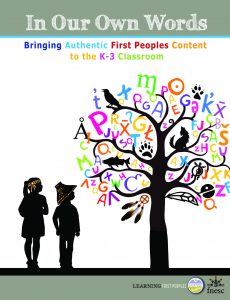 In our own words: Bringing authentic First Peoples content to the K-3 classroom,
In our own words: Bringing authentic First Peoples content to the K-3 classroom,
by the First Nations Education Steering Committee
Niveau scolaire (Grade level): Kindergarten – 3
This resource provides an array of ideas and suggestions that can be applied in whole or in part to incorporate First Peoples content into a K-3 classroom. By using this resource and remaining open to respectful dialogue and consultation with members of the local First Peoples communities, teachers will benefit their students and expand their own comfort with this material. Also available online. See also Authentic First Peoples resources: For use in K-7 classrooms.
 Re-storying education : decolonizing your practice using a critical lens,
Re-storying education : decolonizing your practice using a critical lens,
by Carolyn Roberts
Niveau scolaire (Grade level): Kindergarten – 12
Re-Storying Education is a process of dismantling old narratives taught in education and rebuilding new narratives that include all the voices that have created this place known as Canada today. This vital and timely book outlines how colonialism has shaped both the country and the public school system. Re-Storying Education uses an Indigenous lens, offering ways to put Indigenous education, history, and pedagogy into practice. It invites readers into an open dialogue in the pursuit of a more inclusive and just educational landscape.
by Yatta Kanu
Niveau scolaire (Grade level): Kindergarten – 12
From improved critical thinking to increased self-esteem and school retention, teachers and students have noted many benefits to bringing Aboriginal viewpoints into public school classrooms. In Integrating Aboriginal Perspectives Into the School Curriculum, Yatta Kanu provides the first comprehensive study of how these frameworks can be effectively implemented to maximize Indigenous students’ engagement, learning, and academic achievement.
by Doug Anderson, Lorraine Chiarotto, & Julie Comay
Niveau scolaire (Grade level): 1 – 6
The driving motivation for a second edition was the burning need, in the wake of strong and unequivocal recommendations by the Truth and Reconciliation Commission, to situate Indigenous perspectives into the heart of Canadian educational settings and curricula, most notably in connection with environmental issues. The Indigenous lens in this edition represents a cross-cultural encounter supporting what can become an ongoing dialogue and evolution of practice in environmental inquiry. Some important questions are raised that challenge us to think in very different ways about things as fundamental as the meaning of knowledge.
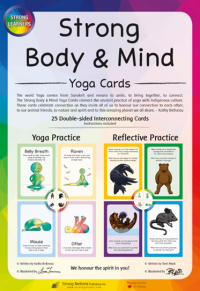 Strong body & mind yoga cards,
Strong body & mind yoga cards,
by Kathy Beliveau & Terri Mack; illustrated by Laura Timmermans & Bill Helin
Niveau scolaire (Grade level): Kindergarten – 7
Explores the connection to each other, animals, nature, spirit, and the body through yoga. Consists of two sets of cards which can be combined into different sequences. One set emphasizes yoga practice and the other focuses on reflective practice based on the Seven Sacred Teachings and Indigenous values.
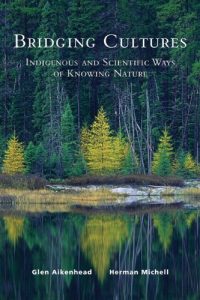 Bridging cultures: Scientific and indigenous ways of knowing nature,
Bridging cultures: Scientific and indigenous ways of knowing nature,
by Glen Aikenhead & Herman Michell
Niveau scolaire (Grade level): Kindergarten – 12
This book supports science teachers, teacher candidates, and science educators preparing to implement science curricula that recognize Indigenous knowledge as a foundational way to understand the physical world.
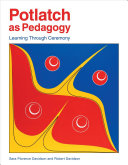 Potlatch as pedagogy: Learning through ceremony,
Potlatch as pedagogy: Learning through ceremony,
by Sara Florence Davidson & Robert Davidson
Niveau scolaire (Grade level): K – 12
Educator Sara Florence Davidson saw how the Haida tradition of the potlatch – which she learned from her father, renowned artist Robert Davidson – could be integrated into contemporary educational practices. In this book, father and daughter present a model for learning that is holistic, relational, practical, and continuous.
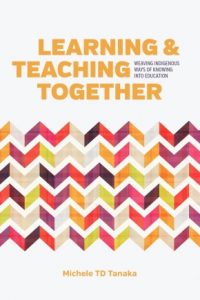 Learning and teaching together: Weaving indigenous ways of knowing into education,
Learning and teaching together: Weaving indigenous ways of knowing into education,
by Michele T.D. Tanaka
Niveau scolaire (Grade level): K – 12
This book recounts how pre-service teachers immersed in a cross-cultural course in British Columbia began to practice Indigenous ways of knowing. Working alongside Indigenous wisdom keepers, they transformed earth fibres into a mural and, in the process, transformed their own ideas about learning and teaching.This book opens a path for teachers to nurture indigenist cross-cultural understanding in their classrooms.
by Christine M’Lot & Katya Ferguson
Niveau scolaire (Grade level): K – 12
In Resurgence, poetry, art, and narratives from Indigenous authors and educators guide teachers in incorporating Indigenous stories, knowledge, and pedagogies into the classroom. The book is organized into the following four sections: Resistance, Resilience, Restoring, and Reconnecting.
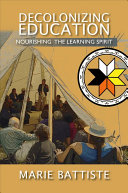 Decolonizing education: Nourishing the learning spirit,
Decolonizing education: Nourishing the learning spirit,
by Marie Battiste
Niveau scolaire (Grade level): K – 12
The author argues that the preservation of Aboriginal knowledge is an Aboriginal right and a right preserved by the many treaties with First Nations. Current educational policies must undergo substantive reform. Central to this process is the rejection of the racism inherent to colonial systems of education, and the repositioning of Indigenous humanities, sciences, and languages as vital fields of knowledge.
 Aboriginal worldviews and perspectives in the classroom: Moving forward,
Aboriginal worldviews and perspectives in the classroom: Moving forward,
by the BC Ministry of Education
Niveau scolaire (Grade level): K – 12
This resources is designed to answer a number of questions, including what is meant by Aboriginal education and by Aboriginal worldviews and perspectives; what is required of teachers and of the education system in order to provide appropriate and authentic teaching in line with the First Peoples Principles of Learning; and where teachers can turn for guidance and support in modifying their practice to incorporate new content and approaches. Online resource only. See also, Shared learnings: Integrating BC Aboriginal content K-10.
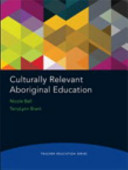 Culturally Relevant Aboriginal Education,
Culturally Relevant Aboriginal Education,
by Nicole Bell & Terrylynn Brant
Niveau scolaire (Grade level): K – 12
Provides teacher candidates and in-service teachers with relevant information to help them integrate Aboriginal, First Nations, Métis, and Inuit content, customs, and traditions into the classroom, providing students with a broader perspective of Canada and its population.
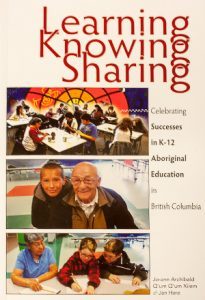 Learning, Knowing, Sharing: Celebrating Successes in K-12 Aboriginal Education in British Columbia,
Learning, Knowing, Sharing: Celebrating Successes in K-12 Aboriginal Education in British Columbia,
by Jo-ann Archibald, Q’um Q’um Xiiem, & Jan Hare
Niveau scolaire (Grade level): K – 12
Published by the BC Principals’ & Vice-Principals’ Association and the UBC Faculty of Education, this book highlights practices in British Columbia relating to Aboriginal Education. Topics include Indigenous knowledge, Indigenous language revitalization, Aboriginal family and community engagement and partnerships, and more.
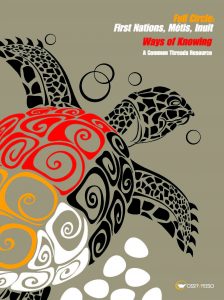 Full circle: First Nations, Métis, Inuit ways of knowing,
Full circle: First Nations, Métis, Inuit ways of knowing,
by Ontario Secondary School Teachers’ Federation
Niveau scolaire (Grade level): 8 – 12
Lesson plans which encourage teachers to incorporate First Nations, Métis, and Inuit ways of knowing into the classroom in the four thematic areas of identity, health, Residential Schools, and land.
by Lynda Gray
Niveau scolaire (Grade level): 9 – 12
Overview of the diverse and complex lives of First Nations people with subjects including veterans, youth, urbanization, child welfare, appropriate questions to ask a First Nations person, feminism, the medicine wheel, Two-spirit (LGBTQ), residential schools, the land bridge theory, and language preservation.
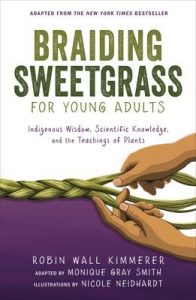
by Robin Wall Kimmerer; adapted by Monique Gray Smith; illustrations by Nicole Neidhardt
Niveau scolaire (Grade level): 7 – 12
Botanist Robin Wall Kimmerer’s best-selling book Braiding Sweetgrass is adapted for a young adult audience by children’s author Monique Gray Smith, bringing Indigenous wisdom, scientific knowledge, and the lessons of plant life to a new generation.
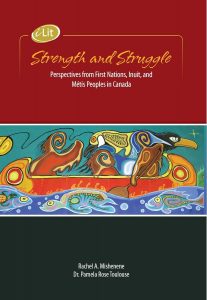 Strength and struggle: Perspectives from First Nations, Inuit, and Métis peoples in Canada,
Strength and struggle: Perspectives from First Nations, Inuit, and Métis peoples in Canada,
by educational advisors: Rachel A. Mishenene & Pamela Rose Toulouse; reviewers: Denise Augustine; [authors and artists: Joyce Atcheson & others]
Niveau scolaire (Grade level): 10 – 11
A rich array of short stories, poetry, music lyrics, graphic art, articles, essays, and other pieces that will have students laughing, crying, talking, and thinking. It is a true celebration of First Nations, Inuit and Métis writing and art. Part of McGraw-Hill Ryerson’s Lit Collection of supplementary student resources for high school English courses. Also includes an accompanying Teacher’s Resource here.
Trouver d’autres ressources
Voici quelques conseils pour trouver d’autres ressources dans ce domaine :
- Sur la page principale du site de la bibliothèque de l’UBC, utilisez la boîte de recherche générale pour rechercher des matériaux à travers toutes les succursales de la bibliothèque de l’UBC.
- Pour limiter vos résultats aux matériels disponibles à la Bibliothèque de l’éducation, visitez le site web de la Bibliothèque de l’éducation et effectuez une recherche à l’aide de la case “Search Education Resources” située dans la bande à gauche de l’écran.
- Remarque : les ressources étant principalement cataloguées en anglais, les termes ci-dessous donnent généralement plus de résultats que les recherches effectuées en français. Vous pouvez filtrer votre liste de résultats par langue dans la barre latérale de gauche.
- Utilisez des termes de recherche spécifiques, tels que
- “indigenous peoples” AND “education” AND “canada”, “indigenous children” AND “education” AND “british columbia”, “indigenous peoples” AND “study and teaching” AND “canada”, ou “indigenous pedagogy”
- Pour trouver des plans de cours, incluez “lesson plans”, “lesson planning”, or “activity programs” dans vos termes de recherche.
Finding More Resources
To find more resources in this area, try the following:
- Search using the General tab on the UBC Library website to look for material in all UBC Library branches.
- Search using “Search Education Resources” box in the left hand bar on the Education Library website to limit your results to physical materials in the Education Library.
- Use specific search terms, such as
- “indigenous peoples” AND “education” AND “canada”, “indigenous children” AND “education” AND “british columbia”, “indigenous peoples” AND “study and teaching” AND “canada”, and “indigenous pedagogy”
- To find lesson plans, include “lesson plans”, “lesson planning”, or “activity programs” in your search terms.

